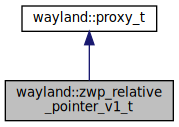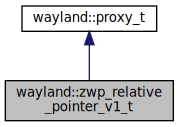relative pointer object More...
#include <wayland-client-protocol-unstable.hpp>


Public Types | |
| enum | wrapper_type { wrapper_type::standard, wrapper_type::display, wrapper_type::foreign, wrapper_type::proxy_wrapper } |
Public Member Functions | |
| std::function< void(uint32_t, uint32_t, double, double, double, double)> & | on_relative_motion () |
| relative pointer motion More... | |
| uint32_t | get_id () const |
| Get the id of a proxy object. More... | |
| std::string | get_class () const |
| Get the interface name (class) of a proxy object. More... | |
| uint32_t | get_version () const |
| Get the protocol object version of a proxy object. More... | |
| wrapper_type | get_wrapper_type () const |
| Get the type of a proxy object. More... | |
| void | set_queue (event_queue_t queue) |
| Assign a proxy to an event queue. More... | |
| wl_proxy * | c_ptr () const |
| Get a pointer to the underlying C struct. More... | |
| bool | proxy_has_object () const |
| Check whether this wrapper actually wraps an object. More... | |
| operator bool () const | |
| Check whether this wrapper actually wraps an object. More... | |
| bool | operator== (const proxy_t &right) const |
| Check whether two wrappers refer to the same object. More... | |
| bool | operator!= (const proxy_t &right) const |
| Check whether two wrappers refer to different objects. More... | |
| void | proxy_release () |
| Release the wrapped object (if any), making this an empty wrapper. More... | |
Detailed Description
relative pointer object
A wp_relative_pointer object is an extension to the wl_pointer interface used for emitting relative pointer events. It shares the same focus as wl_pointer objects of the same seat and will only emit events when it has focus.
Definition at line 3067 of file wayland-client-protocol-unstable.hpp.
Member Enumeration Documentation
◆ wrapper_type
|
stronginherited |
Underlying wl_proxy type and properties of a proxy_t that affect construction, destruction, and event handling
| Enumerator | |
|---|---|
| standard | C pointer is a standard type compatible with wl_proxy*. Events are dispatched and it is destructed when the proxy_t is destructed. User data is set. |
| display | C pointer is a wl_display*. No events are dispatched, wl_display_disconnect is called when the proxy_t is destructed. User data is set. |
| foreign | C pointer is a standard type compatible with wl_proxy*, but another library owns it and it should not be touched in a way that could affect the operation of the other library. No events are dispatched, wl_proxy_destroy is not called when the proxy_t is destructed, user data is not touched. Consequently, there is no reference counting for the proxy_t. Lifetime of such wrappers should preferably be short to minimize the chance that the owning library decides to destroy the wl_proxy. |
| proxy_wrapper | C pointer is a wl_proxy* that was constructed with wl_proxy_create_wrapper. No events are dispatched, wl_proxy_wrapper_destroy is called when the proxy_t is destroyed. Reference counting is active. A reference to the proxy_t creating this proxy wrapper is held to extend its lifetime until after the proxy wrapper is destroyed. |
Definition at line 105 of file wayland-client.hpp.
Member Function Documentation
◆ c_ptr()
|
inherited |
Get a pointer to the underlying C struct.
- Returns
- The underlying wl_proxy wrapped by this proxy_t if it exists, otherwise an exception is thrown
◆ get_class()
|
inherited |
Get the interface name (class) of a proxy object.
- Returns
- The interface name of the object associated with the proxy
◆ get_id()
|
inherited |
◆ get_version()
|
inherited |
Get the protocol object version of a proxy object.
Gets the protocol object version of a proxy object, or 0 if the proxy was created with unversioned API.
A returned value of 0 means that no version information is available, so the caller must make safe assumptions about the object's real version.
display_t will always return version 0.
- Returns
- The protocol object version of the proxy or 0
◆ get_wrapper_type()
|
inlineinherited |
Get the type of a proxy object.
Definition at line 288 of file wayland-client.hpp.
◆ on_relative_motion()
| std::function< void(uint32_t, uint32_t, double, double, double, double)> & zwp_relative_pointer_v1_t::on_relative_motion | ( | ) |
relative pointer motion
- Parameters
-
utime_hi high 32 bits of a 64 bit timestamp with microsecond granularity utime_lo low 32 bits of a 64 bit timestamp with microsecond granularity dx the x component of the motion vector dy the y component of the motion vector dx_unaccel the x component of the unaccelerated motion vector dy_unaccel the y component of the unaccelerated motion vector
Relative x/y pointer motion from the pointer of the seat associated with this object.
A relative motion is in the same dimension as regular wl_pointer motion events, except they do not represent an absolute position. For example, moving a pointer from (x, y) to (x', y') would have the equivalent relative motion (x' - x, y' - y). If a pointer motion caused the absolute pointer position to be clipped by for example the edge of the monitor, the relative motion is unaffected by the clipping and will represent the unclipped motion.
This event also contains non-accelerated motion deltas. The non-accelerated delta is, when applicable, the regular pointer motion delta as it was before having applied motion acceleration and other transformations such as normalization.
Note that the non-accelerated delta does not represent 'raw' events as they were read from some device. Pointer motion acceleration is device- and configuration-specific and non-accelerated deltas and accelerated deltas may have the same value on some devices.
Relative motions are not coupled to wl_pointer.motion events, and can be sent in combination with such events, but also independently. There may also be scenarios where wl_pointer.motion is sent, but there is no relative motion. The order of an absolute and relative motion event originating from the same physical motion is not guaranteed.
If the client needs button events or focus state, it can receive them from a wl_pointer object of the same seat that the wp_relative_pointer object is associated with.
Definition at line 6149 of file wayland-client-protocol-unstable.cpp.
◆ operator bool()
|
inherited |
Check whether this wrapper actually wraps an object.
- Returns
- true if there is an underlying object, false if this wrapper is empty
◆ operator!=()
|
inherited |
Check whether two wrappers refer to different objects.
◆ operator==()
|
inherited |
Check whether two wrappers refer to the same object.
◆ proxy_has_object()
|
inherited |
Check whether this wrapper actually wraps an object.
- Returns
- true if there is an underlying object, false if this wrapper is empty
◆ proxy_release()
|
inherited |
Release the wrapped object (if any), making this an empty wrapper.
Note that display_t instances cannot be released this way. Attempts to do so are ignored.
- Examples
- foreign_display.cpp.
◆ set_queue()
|
inherited |
Assign a proxy to an event queue.
- Parameters
-
queue The event queue that will handle this proxy
Assign proxy to event queue. Events coming from proxy will be queued in queue instead of the display's main queue.
See also: display_t::dispatch_queue().
- Examples
- proxy_wrapper.cpp.
The documentation for this class was generated from the following files:
